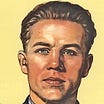If there is a meaning to life, then love will factor into it. There is a reason why the most cynical try to cheapen love by perverting it, selling it, over-saturating it, redefining it, and every other way to milk love for all it’s worth. Yet we still crave love. We yearn to express love, and we feel empty inside without it. Perhaps the greatest expression of love is between a man and his woman. Despite what modernity tells you, it is such a self-evident truth; it requires years of indoctrination to refuse it and decades to refute the claim, yet only the spark of a moment to bring the cynic back from the brink.
Keep reading with a 7-day free trial
Subscribe to Old Glory Club to keep reading this post and get 7 days of free access to the full post archives.





